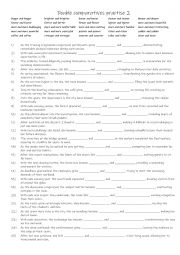
|
B1+-B2 25 Double comparatives Part 2
Double comparatives are used to describe a situation where something increases or decreases progressively. By repeating the comparative form, we emphasise how the quality or action becomes more extreme. This structure is common in English, and learning it can help express change in a dynamic and descriptive way. Native speakers use double comparati...
Level: intermediate
Age: 9-100
Type:
Downloads: 102
|
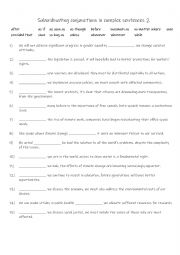
|
B1+-B2 Subordinating conjunctions in complex sentences Part 2
Using subordinating conjunctions allows students to express more detailed and nuanced thoughts. For instance, "although" and "even if" help convey contrast or condition in sophisticated ways. They add variety to writing and speaking, moving beyond simple sentences and making communication more engaging and dynamic. For example, "whenever" or "whoev...
Level: intermediate
Age: 10-100
Type:
Downloads: 129
|
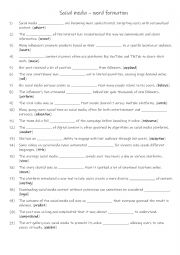
|
B1 Social media word formation
Understanding word formation allows students to expand their vocabulary, enabling them to express themselves more precisely and creatively. Knowing how to manipulate words helps them create varied sentence structures, making their writing more engaging and dynamic. Mastering word formation is key to achieving higher levels of language proficiency, ...
Level: intermediate
Age: 8-100
Type: worksheet
Downloads: 115
|
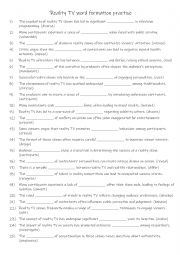
|
B1-B2 Reality TV word formation practise
Understanding word formation allows students to expand their vocabulary, enabling them to express themselves more precisely and creatively. Knowing how to manipulate words helps them create varied sentence structures, making their writing more engaging and dynamic. Mastering word formation is key to achieving higher levels of language proficiency, ...
Level: intermediate
Age: 8-100
Type:
Downloads: 134
|
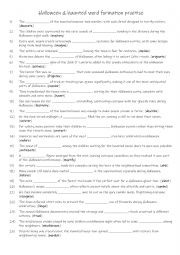
|
B1-B2 Halloween & haunted word formation practise
Understanding word formation allows students to expand their vocabulary, enabling them to express themselves more precisely and creatively. Knowing how to manipulate words helps them create varied sentence structures, making their writing more engaging and dynamic. Mastering word formation is key to achieving higher levels of language proficiency, ...
Level: intermediate
Age: 9-100
Type:
Downloads: 112
|
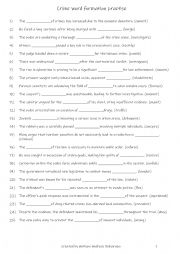
|
B1-B2 Crime word formation practise
Understanding word formation allows students to expand their vocabulary, enabling them to express themselves more precisely and creatively. Knowing how to manipulate words helps them create varied sentence structures, making their writing more engaging and dynamic. Mastering word formation is key to achieving higher levels of language proficiency, ...
Level: intermediate
Age: 8-100
Type:
Downloads: 131
|
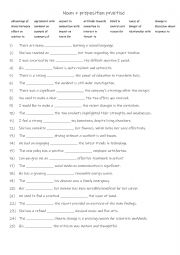
|
B1-B2 Noun + preposition practise Part 3
Understanding how to pair nouns with the correct prepositions helps convey ideas more clearly, reducing ambiguity. Many phrases in English are idiomatic; knowing these combinations allows students to speak and write more naturally, as native speakers do. Many of these nouns are relevant in everyday conversations and discussions, making this knowled...
Level: intermediate
Age: 9-100
Type:
Downloads: 102
|
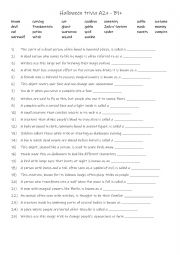
|
A2+-B1+ Halloween trivia 25 words
Students familiarise themselves with the 25 Halloween related words and their meanings. Then they read the definitions and write the word being described in the space provided. Answers on page 2.
Level: intermediate
Age: 9-100
Type:
Downloads: 119
|
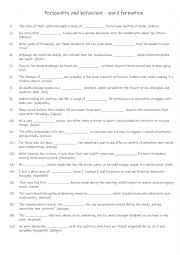
|
B1 Personality and behaviour - word formation
Understanding word formation allows students to expand their vocabulary, enabling them to express themselves more precisely and creatively. Knowing how to manipulate words helps them create varied sentence structures, making their writing more engaging and dynamic. Mastering word formation is key to achieving higher levels of language proficiency, ...
Level: intermediate
Age: 8-100
Type:
Downloads: 108
|
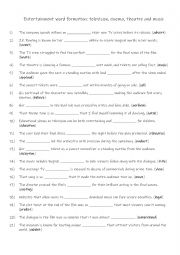
|
B1 Entertainment word formation television, cinema, theatre and music
Understanding word formation allows students to expand their vocabulary, enabling them to express themselves more precisely and creatively. Knowing how to manipulate words helps them create varied sentence structures, making their writing more engaging and dynamic. Mastering word formation is key to achieving higher levels of language proficiency, ...
Level: intermediate
Age: 8-100
Type:
Downloads: 113
|












